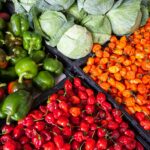Cooking can be an enjoyable and creative pursuit, but it’s essential to keep in mind the hazards inherent to any kitchen environment, like sharp knives and hot surfaces, which pose potential dangers. This comprehensive guide offers essential kitchen safety tips designed to create a secure cooking experience – with tips geared at helping prevent accidents while creating an overall safer kitchen space.
1. Appropriate Knive Handling
Sharp Knives and Cutting Techniques: One of the key tools in any kitchen is a knife; however, improper usage could result in serious injuries. Always ensure your blades are sharp; dull ones require additional force when cutting and are more likely to slip than their counterparts. Use appropriate techniques when cutting ingredients – for instance using claw grip when chopping vegetables for safety measures.
2. Avoid Burns and Scalds
Hot Surfaces and Spills: Burns and Scalds Kitchen injuries such as burns and scalds are an all too familiar reality. To protect against them, always exercise extreme caution around hot surfaces like stovetops and ovens; use pot holders or oven mitts when handling cookware that has just come from the oven; use extra caution when working with liquids as spillage can result in serious burns.
3. Food Handling and Cross-Contamination
Hand Washing and Cross-Contamination Control Solutions: Proper food handling is key in order to prevent foodborne illnesses. Be sure to wash your hands prior to and after handling raw ingredients to reduce cross-contamination; additionally, using separate cutting boards for raw meat, poultry and vegetables prevents spread of harmful bacteria.
4. Fire Safety
Preventing Kitchen Fires: As kitchen fires can spread rapidly, fire prevention must always remain top of mind. Keep all flammable objects away from stovetops and never allow cooking to unattended; in case of grease fires use lids instead to smother flames instead.
5. Component Usage Considerations for Electrical Appliances
Proper Use and Maintenance of Electrical Appliances: Electrical appliances have become indispensable components of modern kitchens, yet they also pose risks. Before using any electrical device, check its cord for damage before plugging it in; overloaded outlets must not be overloaded by using too many cords at one time; unplugging appliance by grasping only its plug to avoid potential damages caused by grasping cord.
6. Child and Pet Safety
Establishing a Secure Cooking Environment: For families with children or animals, creating a safe cooking environment is critical. Use back burners whenever possible and turn pot handles away from edges for accidental spillage prevention. Furthermore, sharp objects or hot items should remain out of reach to maintain an inviting cooking experience for everyone involved.
7. Handling Grease
Safe Disposal when Cooking Grease: Grease and cooking oils present potential fire risks when not managed safely. Allow grease to cool before disposing in an approved sealed container; do not pour down drains as this could clog pipes and spark fires in your kitchen.
8. Emergency Prepared
Know you emergancy plan: Accidents still happen despite our best efforts; make sure that you know where and how to use fire extinguishers; have a well-stocked first aid kit in the kitchen and become knowledgeable of basic first aid techniques.
9. Proper Clothing
Be dressed for kitchen: Wearing appropriate attire is key to avoiding accidents. Loose clothing that could tangle in appliances should be kept to a minimum; non-slip shoes will protect you against falls caused by spilled liquid.
10. Storage and Handling of Utensils
Organising Utensils to Improve Safety: Use a knife block or similar storage facility for sharp utensils in order to avoid accidental cuts when reaching for them, while heavy items should be stored at waist level in order to minimize straining when lifting them.
In conclusion
Cooking should always be enjoyable and rewarding experience, yet safety must always come first. By following these essential kitchen safety tips you can significantly lower the risk of accidents or injuries during preparation; from proper knife handling and fire safety protocols all contribute towards providing a secure cooking environment – safe cooks are confident cooks!




